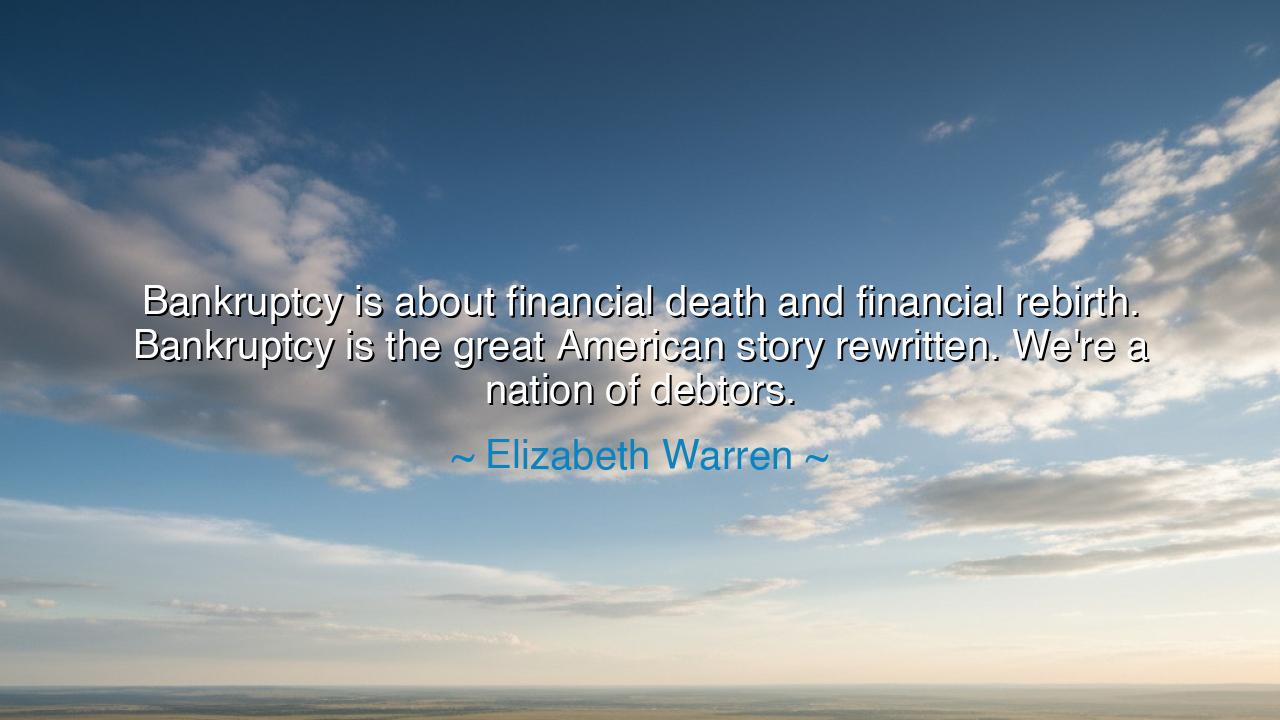
Bankruptcy is about financial death and financial rebirth.
Bankruptcy is about financial death and financial rebirth. Bankruptcy is the great American story rewritten. We're a nation of debtors.






"Bankruptcy is about financial death and financial rebirth. Bankruptcy is the great American story rewritten. We're a nation of debtors." Thus spoke Elizabeth Warren, a scholar of law and justice, whose words pierce through the shame and fear often bound to the idea of failure. In this saying lies not an economic lesson alone, but a spiritual revelation about renewal, redemption, and the enduring courage of a people who rise again after every fall. For Warren, bankruptcy is not the end of fortune—it is a mirror of the human condition, the eternal cycle of loss and renewal that defines both individual lives and nations.
When she says “financial death and financial rebirth,” Warren reminds us that to fail is not to perish, but to transform. In the ancient world, debt was a chain that bound the soul as well as the body. A man who could not pay what he owed was often cast into slavery or prison. But in America—a nation built by dreamers, risk-takers, and those who dared to begin again—the story changed. Bankruptcy became not a mark of disgrace, but a rite of renewal, a chance for the fallen to rebuild. It is, as she says, “the great American story rewritten,” for it reflects the nation’s founding spirit: the belief that one’s worth is not fixed, that redemption is always possible, and that even from ruin, greatness may rise.
The phrase “a nation of debtors” carries both irony and pride. Warren does not mean it as an insult, but as a truth born of history. From the earliest settlers who borrowed their passage across the ocean, to the entrepreneurs who risked all to build railroads, factories, and fortunes, America has always been a nation that advances through risk. Debt, in her view, is not merely financial—it is the price of hope, the investment in tomorrow. The same energy that drives people to borrow also drives them to create. Debt and innovation are twins, born of the same restless desire to reach beyond one’s grasp. Thus, even our failures are signs of our striving.
Consider the life of Henry Ford, who before revolutionizing the automobile industry, faced financial collapse twice. He founded companies that failed, investors who withdrew, and dreams that crumbled before his eyes. Yet, like the phoenix rising from ashes, he returned stronger, armed with lessons only failure could teach. His bankruptcy was not his death—it was his rebirth, the turning point that gave birth to the Ford Motor Company and the assembly line that reshaped the world. In him, we see Warren’s truth illuminated: that bankruptcy, painful as it is, may be the crucible of innovation, a baptism in humility that forges resilience.
Warren’s insight also speaks to the collective soul of the nation. America’s strength has always been its ability to renew itself after crisis. From the Great Depression to the financial collapse of 2008, from war to recession, the nation has known ruin—but it has never surrendered to it. Each failure has sparked reform, invention, and the will to rise again. This is the essence of rebirth: not denial of failure, but transformation through it. Bankruptcy, in its deeper meaning, becomes a parable of democracy itself—a recognition that no one, and no nation, should be condemned forever by a single downfall.
In this way, Warren’s words carry both mercy and defiance. She refuses to let failure define a person’s worth. Instead, she sees it as part of the moral fabric of progress. To declare bankruptcy, in her view, is not to confess weakness, but to choose life over despair—to admit defeat, yet to claim the right to begin anew. It is an act of faith, a belief that one’s story is not finished. Just as nature renews itself through seasons of decay and bloom, so too must humans accept loss as part of growth. The soil of failure nourishes the roots of future success.
Therefore, let this be the lesson, O seeker of wisdom: do not fear your own collapse. Whether in fortune, in work, or in spirit, when the edifice of your life crumbles, remember that you stand upon sacred ground—the place of beginnings. Like the debtor forgiven, you are free to rebuild, wiser than before. Accept failure as your teacher, humility as your companion, and courage as your guide. In each death, there is a hidden life waiting to be born.
And so, as Elizabeth Warren teaches, we must learn to see bankruptcy—not just in commerce, but in every form of defeat—as part of the greater rhythm of human striving. The past may fall away, but the heart that beats beneath it endures. We are, indeed, a nation of debtors—not because we owe money, but because we owe our existence to hope. And as long as we believe in renewal, as long as we dare to begin again, there is no failure that can claim us, and no death that can deny us the promise of rebirth.






AAdministratorAdministrator
Welcome, honored guests. Please leave a comment, we will respond soon